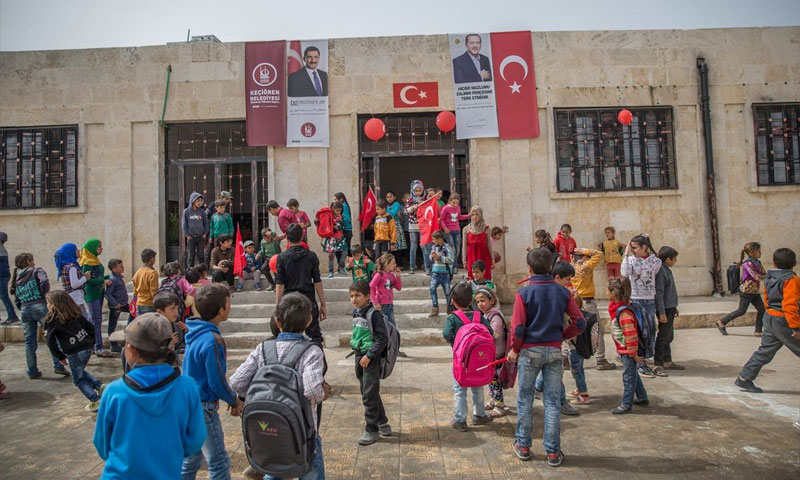Massive challenges face the education sector in Afrin area, revealed a month after the new school year has kicked off, following the complete control over it by the Turkey-backed “Free Army” factions.
Despite the current intention focused on education on the part of the civil and service entities, functioning in Afrin, the problems that overtaken the surface cannot be solved overnight, as they require “dramatic” plans to come up with a complete strategy based on the number of the students and the curricula to be adopted.
Abdo Nabhan, the Education Official at the Afrin Local Council, said that efforts started with the first weeks, in October, aiming at preparing the schools to host thousands of the city’s students, in addition to displaced ones, who came to the area after the latest reconciliation deals in eastern Ghouta, rural Homs and other governorates.
Nabhan said that 232 schools in Afrin and its seven districts were actually prepared and operated.
Schools Fail to Accommodate the Students
The number of the schools in Afrin is yet small if compared to the massive number of students, the principal problem that resulted in this situation is the wide destruction that befell the schools during the war and the usage of schools as military posts by the factions in control of the area.
Due to this, Nabhan said that the schools are following a two-shift-system, pointing to another challenge, which relates to manpower, represented by specialized teachers, for many of the villages have fully prepared schools, but neither the village nor its surrounding have an education staff to cover the whole process.
“With all our energy, we are trying to cover this lack by bringing in teachers from adjacent towns, while adopting a reward-based method as to cover the transportation costs,” said the Education Official.
Mustafa Hassan, a teacher of preparatory stage students, spoke to Enab Baladi about the teachers’ suffering in the beginning, as they were challenged with the ambiguity of the educational situation in the city of Afrin in relation to curriculum, staffs and official recognition of the issued degrees.
“In the beginning, each teacher used to teach students what he/she believes convenient and of that he/she has in mind of the former curriculum designated for each class, until the curricula of the Syrian Interim Government was adopted, which is already in use in the liberated areas in Northern Syria,” the teacher said, adding that “there were not books to follow or to give the students, as they arrived just lately, a month after the start of the school year.”
According to the Education Office under the Afrin Local Council, more than four million school books were printed, and they will be gradually distributed in the city of Afrin and its districts.
Weak Arabic
The challenges facing education in Afrin are not limited to those mentioned above because the shift from the Kurdish curricula to those of the “Interim Government” posed an unexpected obstacle.
The teacher said: “It is known that the Democratic Union Party that used to control Afrin imposed Kurdish as the only language of curricula, and it cancelled Arabic and religious education.”
“Today, the majority of the students, of all grades, have developed a massive weakness in Arabic, now used for the curricula,” he added.
In the same classroom, there are Arab and Kurdish students, in addition to others from the different Syrian governorates, who studied different curricula. The teachers, according to Hassan, are trying to create a common ground between the students and the new curriculum, especially with the large numbers of students within the same classroom.
In May 2016, the “Self-management” in the city of Afrin has issued a statement, providing for closing all the institutes teaching the “Arabic” curriculum of the Syrian regime to ninth grade and high school diploma students.
The schools in Afrin adopted the Syrian regime’s curricula prior to the “Free Army” factions’ control over it, in addition to the Kurdish language, except for the first, second and third grades, the curricula of which were replaced by Kurdish ones.
The teacher has also shed light on the law salary offered to teachers, saying: “It is no more than $100, which is not enough with the high living costs, and some teachers’ need for transportation, in addition to many teachers abstinence from working in this field or the failure to continue.”
Higher Education is Yet Ambiguous
As for higher education, university and institutes, the matter is still unclear, and there are not effective steps in that issue, while Turkey’s talks about initiating intermediate institutes in Afrin is “so far a studied suggestion that lacks implementation.”
The Education Official Abdo Nabhan explained that “there is communication and coordination with the Turkish side concerning this issue, and we are advancing the opening of a university in Afrin, to be a branch of a Turkish governmental one, for speaking about institutes alone would not help the city’s students, especially those who excelled. We have been made positive promises about this.’”
Concerning the private schools and institutes, Nabhan said: “All the private schools and institutes, whether for the elementary, preparatory, high school or higher education, as well as the Sharia schools, opened at mosques, and others were closed until getting a license, which meets the conditions and the criteria we and the Turkish side adopt, so these schools and institutes do not follow the interests of their administrations or the teachers working in them.”

